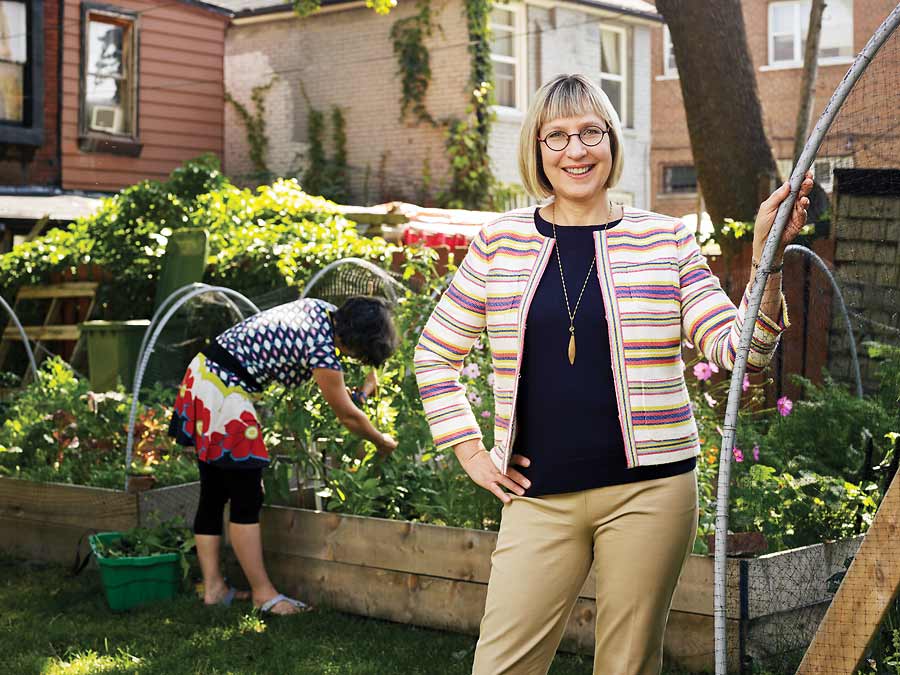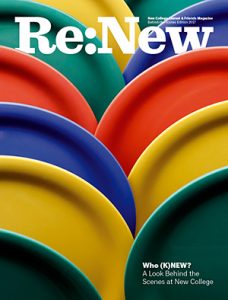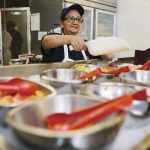Lori Stahlbrand. Photo: Michael Barker.

What’s NEW About Food Equity?
Lori Stahlbrand, New College’s first food equity coordinator, on why we should think carefully about food
“Food is a very powerful tool for making positive social change.”
— Lori Stahlbrand
food /fu:d/ n.
1 any substance that can be taken into the body to maintain life and growth; nourishment. 2 solid nourishment, as opposed to drink. 3 nutriment absorbed by a plant from the earth or air. 4 a particular kind of food (cat food; snack food). 5 ideas as a resource for or stimulus to mental work (food for thought).
equity /’ekwIti/ n. (pl. -ties)
1 fairness, impartiality, even-handedness. 2 the recourse to general principles of justice to correct or supplement common and statute law, esp. to provide remedies not otherwise available.
Besides oxygen, water and sleep, it is the most essential of human needs: food. Ensuring its availability and fair distribution, then, seems equally foundational to the well-being of a world inhabited by about 7.5 billion people—especially if, rather than just wanting them to survive, we want those billions to thrive. These ideas establish the framework within which the concept of food equity asks its probing questions, and seeks to generate feasible solutions as a practice. Better yet: in Canada, New College has placed itself right in the middle of these important debates.
What Is Food Equity?
We cannot understand food equity without two closely related concepts, food security and food sovereignty. The Food and Agriculture Organization of the United Nations defines food security as “a condition in which all people, at all times, have physical and economic access to sufficient, safe and nutritious food to meet their dietary needs and food preferences for an active and healthy life.” It is worth noting the qualifiers here—not just any food, or the bare minimum, will do; it has to be healthy, be culturally appropriate and allow for a full life. The more recent idea of food sovereignty goes further, asserting that people should have some say in how foodstuffs are produced and distributed. Food equity adds to the equation the concept of the food system, which includes all the processes and infrastructure involved in feeding a population. That means thinking about an even wider range of questions around environmental and social sustainability: labour practices and patterns of exclusion, energy use and animal welfare, biodiversity and more.
The New College Connection
Many people have played an important role in placing food equity centre stage at New College and the University of Toronto: June Larkin, director of the Equity Studies program and now the college’s vice-principal; David Clandfield, a professor of French and New College’s principal between 1996 and 2006; Anne MacDonald, director of Ancillary Services at U of T; Chef Jaco Lokker, the university’s director of Culinary Operations; and Margaret Hancock, the former warden of Hart House. And then there’s Lori Stahlbrand, who today works as a health policy specialist on the City of Toronto’s Food Strategy team, but who also served as New College’s first food equity coordinator (way back when it was called food systems coordinator).
Mention food, community engagement, ecological justice and poverty reduction to her, and the already animated eyes behind her round, colourful frames will begin to sparkle. “Food,” she says simply, “is a very powerful tool for making positive social change.” Why? Because it is part of our everyday lives in ways that many other things are not: “People really connect to food issues; we all have experience.” Besides, food is a fulcrum; it lends itself to the exploration of many other topics. The experts call that food’s “multifunctionality.” Stahlbrand again: “It can create jobs, bring people together, help newcomers integrate, allow us to think through land use, support mental and physical health and so much more.”
Growing up in a family of nutrition-conscious hobby vegetable gardeners, Stahlbrand had a keen awareness of food issues, a predisposition her early professional life as a political and environmental journalist only heightened. It also made her realize the enormous power public institutions held to create change in a disconnected food system in which small-to-medium-sized growers had little leverage— and consumers suffered the consequences. By the time she arrived at New College to teach a senior research practicum for the Equity Studies program, she had started her own organization, Local Food Plus, which sought to connect local farmers and Ontario institutions like universities through a process of certification and networking. In part through Stahlbrand’s efforts, U of T in 2006 agreed to make a change: the food services on its St. George campus would purchase a percentage of their fare from producers committed to standards of environmental and social sustainability. At NEW especially, it was a way of aligning the college’s operations with its teachings on social justice.
NEW’s Food Equity Coordinator
In 2012 Stahlbrand decided to return to graduate school, which gave her the time to teach in New College’s New One program and made her a natural candidate for the freshly created position of food systems coordinator. The role constitutes the link between academic research on food matters, the daily lives of students and community organizations. To Stahlbrand, questions around food and equity create an easier ‘in’ to otherwise highly complex issues like climate change. “The two are intimately connected, but food is a little more manageable,” she says, and so potentially more empowering. While no formal affiliation exists between the food equity coordinator and the kitchen or Food Services at NEW, there is a partnership of consultation. As we discuss in the following pages of this magazine, feeding hundreds of students multiple meals a day comes with its own challenges. “It’s where the rubber hits the road,” Stahlbrand laughs. She will continue working with New College through her position at City Hall, and looks forward to the new paths her successor in the role of food equity coordinator, Tammara Soma, will hew. So do we.









